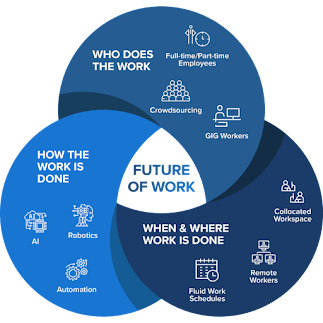The Future of Work: How HR can prepare for the rapidly changing workplace
The world of work is constantly evolving, and it's up to us HR professionals to be at the forefront of change. With advances in technology, new ways of working and new workforce demographics, it's more important than ever to be proactive in preparing for the future of work. Here are some key areas where HR can lead the way and help their organizations stay ahead of the curve.
1. Embrace technology: Technology is transforming work, and HR needs to be at the forefront of this change. Technology is playing an increasingly important role in HR, from automating HR processes to using data and analytics to inform decision-making. By staying up-to-date with the latest trends and innovations, HR can help their organisations take advantage of new technologies to improve efficiency, increase productivity, and drive results.
2. Emphasise skills over degrees: As technology continues to advance, traditional degrees may become less relevant in the workforce. HR professionals can help their organisations by focusing on the skills and abilities of job candidates rather than their academic backgrounds. This can help organisations identify and attract top talent, regardless of their education or background.
3. Foster a flexible work environment: The future of work is likely to be more flexible and hybrid, with many employees working from home, on the go, or in co-working spaces. HR can help their organisations prepare for this shift by creating policies and programs that support flexible work arrangements and ensure that employees have the resources they need to be successful in a remote or flexible work environment.
4. Promote diversity and inclusion: The future of work is also likely to be more diverse, with employees from a wide range of backgrounds and perspectives. HR can help their organizations embrace this diversity by developing policies and programs that promote inclusion and respect for all employees. This can create a more inclusive and welcoming workplace and help organisations attract and retain top talent from diverse backgrounds including Armed forces veterans, of course.
5. Focus on employee development: With the rapid pace of change, employe
In conclusion, the future of work is rapidly changing, and HR professionals have a critical role to play in helping their organizations prepare. By embracing technology, focusing on skills, fostering a flexible work environment, promoting diversity and inclusion, and investing in employee development, HR can help ensure that their organizations are ready for the future of work.




Comments
Post a Comment